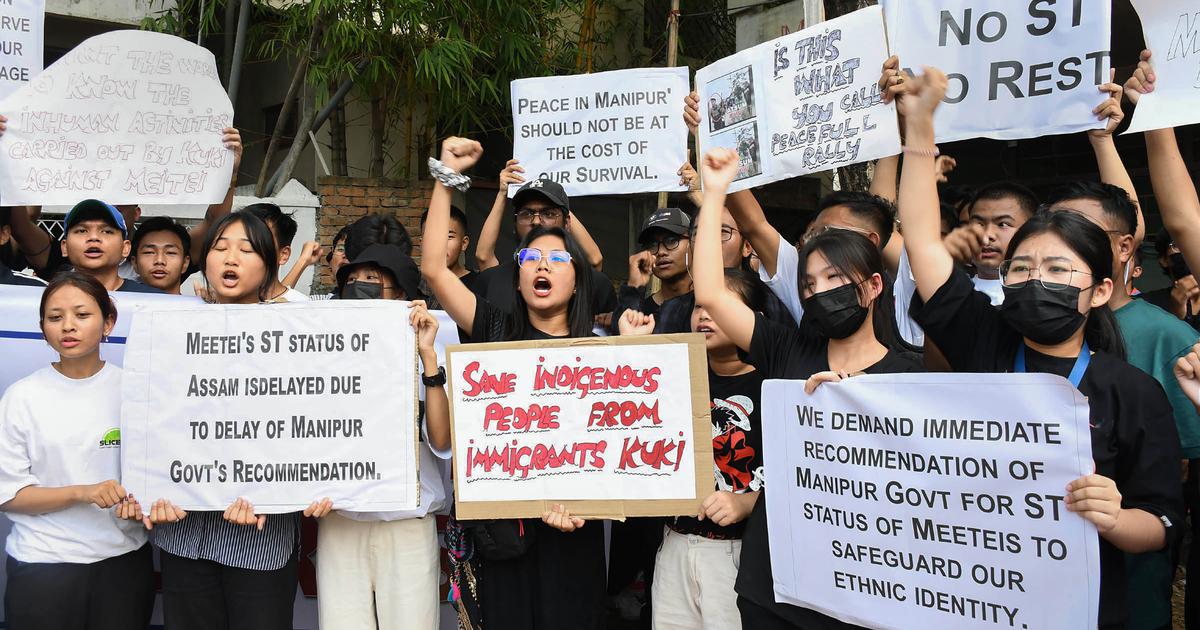
The Manipur High Court Wednesday modified a clause in its controversial order from March 27, 2023 on the issue of the inclusion of the Meitei community in the state’s Scheduled Tribes (ST) list.
The court deleted a paragraph of the order, while disposing of a review petition filed by the Metei Tribes Union (MTU), who were the petitioners in the case in which the court had passed the earlier order.
A single-judge Bench of Justice M V Muralidharan had, on March 27, 2023, issued an order asking the state government to consider recommending the inclusion of the Meitei community in the state’s ST list. That order had been issued during the course of hearings in a petition by the Meitei Tribes Union, seeking directions to the Manipur government to submit such a recommendation to the Union Ministry for Tribal Affairs.
Must read | Behind the violence in Manipur: Longstanding tensions between hill and valley people, the Meitei demand for ST status, and a recent HC order
The review petition had sought a modification of paragraph 17(iii) of the March 27 order which stated, “The first respondent (the Manipur government) shall consider the case of the petitioners for inclusion of the Meetei/Meitei community in the Scheduled Tribe list, expeditiously, preferably within a period four weeks from the date of receipt of a copy of this order in terms of the averments set out in the writ petition and in the line of the order passed in WP(C) No. 4281 of 2002 dated 26.05.2003 by the Gauhati High Court.” With Friday’s order, this paragraph was deleted from the judgement.
This particular paragraph had been contested since it was seen to be in contravention of the Supreme Court’s order on State of Maharashtra V. Milind & Ors. [(2001) 1 SCC 4], which stated that states have no power to amend Presidential orders.
“Courts cannot and should not not expand jurisdiction to deal with the question as to whether a particular caste, sub-caste; a group or part of tribe or sub-tribe is included in any one of the Entries mentioned in the Presidential Orders issued under Article 341 and 342 particularly so when in Clause (2) of the said Article, it is expressly stated that said orders cannot be amended or varied except by law made by Parliament,” the Supreme Court had held.
While hearing two petitions on the flare-up in the state and on the March 27 order last June, the Supreme Court had asked why the original petitioners who had approached the Manipur HC seeking ST status for Meiteis had not told the HC that it does not have the power to recommend reservation. “You never told the HC that it doesn’t have this power… It’s a presidential power,” the CJI told Senior Advocate Sanjay Hegde, who appeared for the original petitioners.
Following this, the petitioners had approached the Manipur High Court for a modification in this paragraph.
The procedure for the inclusion or exclusion from the list of Scheduled Tribes as laid out by the Ministry of Tribal Affairs is that once a representation is received by the ministry, it forwards it to the state government. If it is recommended by the state government, the proposal is forwarded by the Registrar General of India, who can then recommend it to the central government. The Centre can then recommend it to the National Commission for Scheduled Tribes, which can recommend it to Cabinet. Following the Cabinet’s decision, it is to be put up before the Parliament in the form of a Bill to amend the Presidential Order.
Following representations by the MTU and other organisations, the Ministry had written to the state government in 2013 requesting specific recommendations along with the latest socio-economic survey and ethnographic report.
“Our original prayer to the High Court had only been that the state government be directed to reply to the central government’s which had been pending since 2013. That the state government should not be allowed to keep sitting on this letter,” said advocate Ajoy Pebam, who is representing the MTU.
“We are happy to delete that particular paragraph because we do not want anything beyond the judgement of the Supreme Court. That particular part was a little controversial both technically and in people’s views. The issue was simply to reply to the Central government’s letter and a different interpretation could have emerged from it,” said Pebam.
(Courtesy: The Indian Express)

The Hills Journal
K. Salbung, Churachandpur
Manipur-795128